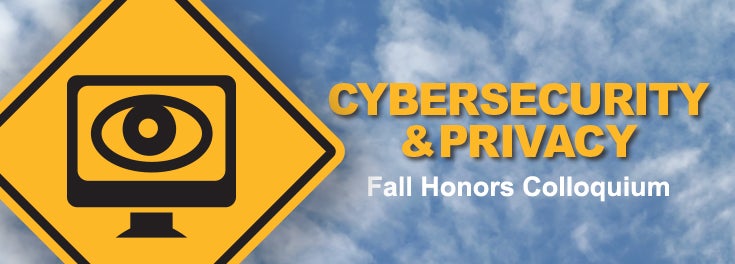
You may already change your passwords frequently. And you probably already select difficult passwords to make it tougher for hackers to gain access to your devices, applications, and accounts. But that may not be enough to stop government, businesses and criminals from learning about your health and friends, where you shop and who you talk to on the phone. This year, the URI Honors Colloquium – “Cybersecurity & Privacy” – is taking on the downsides to our connected world, the threats to our privacy and the breaches to our national security.
Every year for the past 51 years, the free, fall public lecture series brings renowned experts and big thinkers to the URI campus to talk about a topic relevant to global issues and public interest. During this year’s colloquium presentations, held on Tuesday and Wednesday evenings at 7:30 pm, you’ll hear from cybersecurity experts who’ve been on national news programs, written gripping magazine articles and authored best-selling books.
We expect the audiences to be amazed at what’s going on. People think they have a lot more privacy than they do on the Internet. But we have no idea how widespread the surveillance is. I would say nothing is private.
Among them is James Bamford, who will share the latest on fugitive Edward Snowden, who fled to Moscow after leaking top-secret U.S. National Security Agency documents.
Bamford recently returned from a trip to Moscow where he spent three days interviewing Snowden in Moscow, the longest any reporter has spent with Snowden. Their conversations are reported in the September cover story of Wired magazine. The Today Show and PBS News Hour recently interviewed Bamford about his meetings with Snowden. Now he shares them with us in his talk titled “Everyone’s a Target: How America Lost Control of the National Security Agency, and Can it be Reined In?” on Sept. 16 at 7:30 p.m. in Edwards Hall, 64 Upper College Road.
“Many of the speakers are national and global news makers,” said Ed Lamagna, University of Rhode Island professor of computer science and one of four coordinators for the University’s 2014 Honors Colloquium. “They have recently been on CBS’ 60 Minutes, Moyers and Company on PBS, Democracy Now! (which airs on NPR, Pacifica and college radio stations), and several have spoken recently at leading university centers focusing on Internet law like those at Stanford and Harvard.” And because of URI’s prominence in the field – our Digital Forensics and Cyber Security Center is designated a National Center of Academic Excellence by the National Security Agency and the Department of Homeland Security – Lamagna said several of our speakers have told us they are flattered to have been invited.
From the very first lecture to the last, the lineup is filled with speakers who will alarm, challenge and entertain. The series kicked off on Tuesday, September 9, with “Too Much Information?” presented by Harry Lewis, the Gordon McKay professor of computer science at Harvard University and co-author of “Blown to Bits: Your Life Liberty and Happiness After the Internet Explosion.” It concludes on Tuesday, Dec. 2, with “Surveillance and Power,” a presentation by Bruce Schneier, internationally renowned cryptographer, computer security and privacy specialist and author. Dubbed a “security guru” by The Economist, he’s published 12 books on the subjects of computer security and cryptography.
“We expect the audiences to be amazed at what’s going on. People think they have a lot more privacy than they do on the Internet. But we have no idea how widespread the surveillance is. I would say nothing is private,” Lamagna said.
His fellow honors colloquium coordinator Lisa DiPippo said systems and individuals are vulnerable to massive privacy breeches and cyber crime. “If you want a recent example, look at Stuxnet (a computer worm dating back to 2010), the world’s first digital weapon that helped impede Iran’s ability to develop nuclear weapons. There is lots of speculation that governments were behind that effort,” said DiPippo, professor of computer science and the academic director of the Cyber Security Program in URI’s Digital Forensics & Cyber Security Center.
Joining Lamagna and DiPippo as coordinators, are Victor Fay-Wolfe, professor and director of URI’s Cybersecurity and Digital Forensics Center and Yan Sun, professor of electrical, computer and biomedical engineering. We thank Cox Business for its presenting sponsorship of the 2014 Honors Colloquium.
